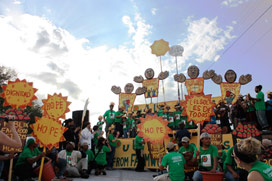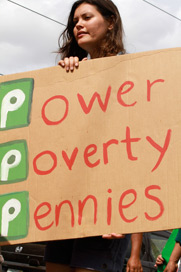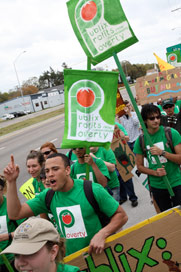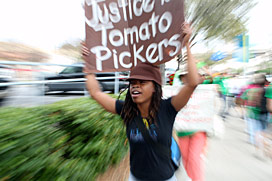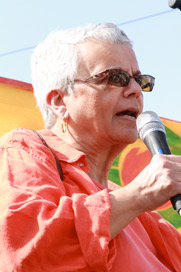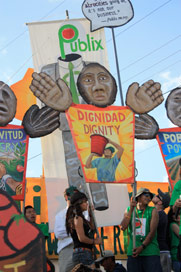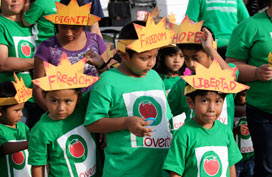Day Five Update
Major Convergence on Publix for Rally & Pageant
Tampa, FL
March 5, 2011
The pageant told the story of how decades of abuse and degradation in the fields is giving way today to hope for a future of fair wages and dignity -- only to be threatened by the opposition of Publix, which would plunge farmworkers back into the darkness of the Harvest of Shame... and of how the alliance of workers and consumers overcomes that opposition in the end and "will not only help free workers from oppressive conditions in the fields, but ... will also free Publix from the impossible burden of supporting and justifying that oppression," in the words of Lucas Benitez of the CIW. |
And marched. And marched. Three separate marches through three major thoroughfares of Tampa, taking our message to tens of thousands of Floridians before converging in a massive picket outside a Publix in downtown Tampa.
|
|
|
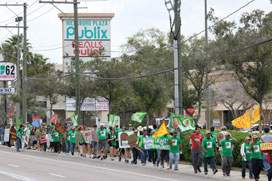 As the marches made their way through town toward the convergence point where the rally would be held, they grew... |
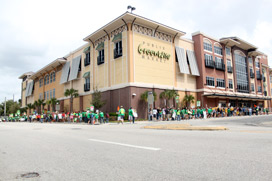 ... and grew (this march route included a short but powerful picket at a Pubiix "Greewise"-branded store, the company's effort to keep up with the Whole Foods market with higher end, more fair trade products). |
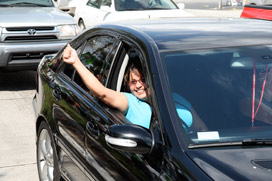 The marchers were met with honking horns... |
 ... and raised fists along both routes... |
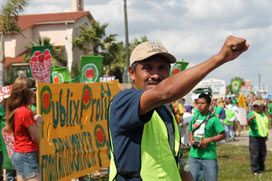 ... which never failed to raise the marchers' spirits and help propel them along their respective routes. |
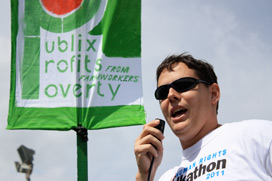 At noon, the two longer marches were joined by a third, 1.5 mile march led by the children of the CIW and launched by a moving speech by the mayor of nearby Sarasota, Kelly Kirschner. Mayor Kirschner, who spent four years in Guatemala with the Peace Corps and working in development, addressed the crowd in English and fluent Spanish, and exuded the kind of compassion and deep respect for human rights that comes from sharing one's life with people whose rights are under constant, real threat. |
 As they approached the convergence point for the rally... |
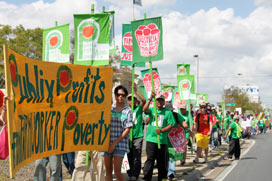 ... they swelled to many times their original size. |
The feeling was perhaps best captured by the words of one of the many Tampa police assigned to the rally, who was overheard to say, "It's getting thick out here, send some more (officers)"... |
|
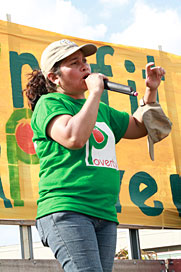 Nely Rodriguez of the CIW spoke to the issues facing women who work in the fields, and her comments were fueled by a sense of righteous anger at Publix's intransigence. |
 Lucas recalled the Do the Right Thing Tour's stop in Atlanta, the lessons of the Civil Rights movement, and the pride of those who, fifty years later, look back on their role in helping to end the long nightmare of legal segregation. He told the crowd that they, too, would look back on this march one day - on the obstacles they faced and overcame, including the intense heat of the day that felled more than one marcher -- and feel that same pride of having persevered, marched on, and been part of the victory of Fair Food over ignorance and greed. |
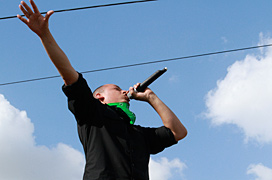 The stage was then set for the arrival of a man who has been with the Campaign for Fair Food since its inception: Los Angeles-based hip-hop artist Olmeca. On this day, as he has so many times before at CIW mass actions from California to Chicago to Miami, Olmeca inspired the crowd with a blend of deft wordcraft and truly heartfelt conviction to the struggle of Immokalee's farmworkers for a better life. |
 The music and speeches primed the appreciative crowd for what was to come next... |
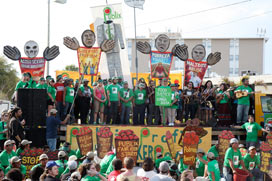 ... an original puppet theater, a pageant really, reminiscent of the pageants of worker protest of the early 20th century. At that time, workers who needed to tell their story to those who would support their struggles -- long before television news, much less the communications revolution brought about by the internet -- used theater much like the pageant performed yesterday in the shadow of the Publix on Dale Mabry Highway in 21st-century Tampa. ... an original puppet theater, a pageant really, reminiscent of the pageants of worker protest of the early 20th century. At that time, workers who needed to tell their story to those who would support their struggles -- long before television news, much less the communications revolution brought about by the internet -- used theater much like the pageant performed yesterday in the shadow of the Publix on Dale Mabry Highway in 21st-century Tampa. |
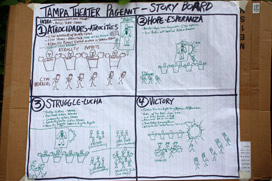 The story was told in four parts: first, a depiction of the brutal conditions that Florida farmworkers have endured for decades; second, the hope for a better future brought about by the alliance of farmworkers and consumers through the Campaign for Fair Food; third, the struggle against Publix's attempts to undermine these nascent and still fragile reforms; and finally, the inevitable victory of the movement for human rights and justice over an indefensible, and ultimately unsustainable, status quo. |
|
|
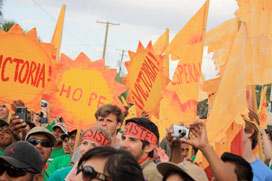 The pageant wasn't contained to the stage. It was, in keeping with tradition, participatory, involving the audience in the narrative... |
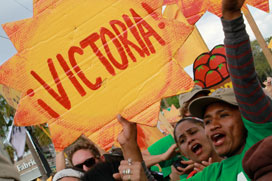 ... transforming the moment of victory into a moment of joy shared by all of those present at the rally. |
As Lucas said in his speech before the pageant, "Publix claims it cares about Florida's families, so why does it not care about farmworkers' families? Are we not part of the same community?" |
That reflection led workers back, once again, to the tour crew's deeply moving experience in Atlanta, and to the words of staunch segregationist George Wallace -- "Segregation now, segregation tomorrow, segregation forever" -- that now echoed disturbingly in the words of Publix's spokespeople and the actions of the $25-billion corporation in response to the Campaign for Fair Food. But just as the fight to defend the indefensible system of segregation ultimately gave way to history's inevitable march towards greater justice, so too will Publix's effort to cling to a dying structure of labor exploitation likewise give way to the movement for full human rights in the fields. And though the sun set on this day of protest, the sun of hope from the workers' pageant will continue to rise over the fields of Immokalee until its promise of human rights shines down on all the men and women who pick Florida's tomatoes, including those who pick tomatoes sold in the aisles of Publix. |



